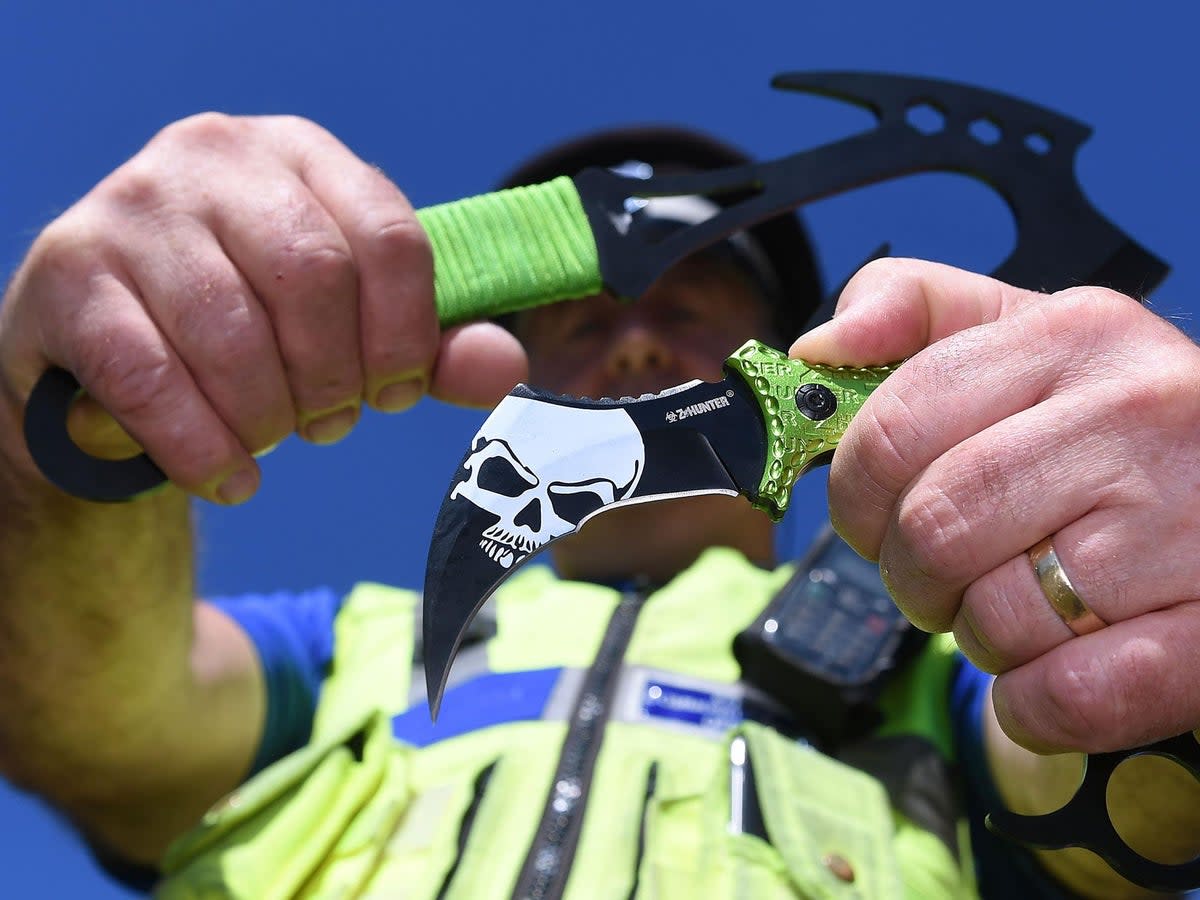Machetes and zombie knives to be banned after loopholes leave police powerless

Machetes and zombie-style knives will be banned under government plans to close loopholes currently leaving police powerless to seize them from criminals’ homes.
Ministers are consulting on legal changes that would ban the sale, possession, importation, manufacture and supply of the weapons, which can currently be purchased cheaply and legally online.
One popular retailer currently has an entire section of its website devoted to machetes, starting at £25, including some advertised along belt loops and sharpeners to keep “blades razor sharp for the best performance”.
Since so-called zombie knives were banned in 2016, manufacturers have been evading the law by altering the design, meaning that similar large knives with serrated edges continue to be sold as “hunting” or “fantasy” knives.
The Home Office has launched a public consultation on what it described as a “targeted ban of certain types of large knives that seem to be designed to look menacing with no practical purpose”.
It plans to add them to a list of prohibited weapons, which would bar their sale and make possessing them in private an offence.
The current law means that machetes and large knives are illegal to carry in public places but can be kept at home, leaving police powerless to seize them even when they believe they could be used in future violence.
A consultation document contains examples of cases where the existing loophole stopped action, including:
A domestic incident where a woman was “in fear” after finding a stash of knives and drugs belonging to her partner, but police had no power to seize a sword-like weapon.
Police being unable to seize a 44cm machete from the bedroom of a drug dealer with previous convictions for knife possession and grievous bodily harm.
Officers having to leave two machetes in the home of a murder suspect with “multiple links with local gangs”.
Suella Braverman, the home secretary, said: “The thugs wielding these deadly knives aim to terrorise their victims and the public, and too often even carry out horrific or fatal attacks. They are emboldened by the cowardly idea that carrying these blades inflates their own status and respect.
“This can’t go on. These plans seek to give the police greater powers to seize and destroy these weapons and impose harsher penalties on the criminals selling them, keeping them off our streets and making communities safer.”
Official figures show that knife crime has been rising following a steep drop during the Covid pandemic, although the number of young people hospitalised with stab wounds remains down by a quarter on 2019.
Almost 40 per cent of all killings in England and Wales are committed using a knife or bladed weapon, and although police figures do not specify the type the policing minister Chris Philp said murderers were “often using large knives that have no legitimate use”.
Earlier this month, a judge urged jurors to write to their MPs about the “shocking” availability of dangerous weapons online after a young man was found guilty of killing another 18-year-old with a 22-inch long zombie knife.
Emadh Miah, 18, faces life in prison when he is sentenced next week after murdering Ghulam Sadiq, who he ambushed and stabbed near his home in Leytonstone, east London, in August last year.
Judge Christine Laing KC thanked the jurors who had to watch “distressing” footage of Mr Sadiq’s death during the trial, adding: “I advise you to write to your MPs and ask why it is that weapons like the one you saw in this case can be bought from a website legitimately.
“These weapons are there for anybody to purchase and it is beyond me as to why that is.”
A government consultation, which will run for seven weeks, is asking for views on whether bladed weapons of certain lengths should be banned and for information on the legitimate use of machetes by gardeners and in other trades.
Other proposals include additional police seizure powers, increasing prison sentences for manufacturing, selling and supplying prohibited offensive weapons and if the criminal justice system should treat public possession of machetes and banned knives more seriously than other types.
The government is looking at creating a new offence of possessing bladed articles “with the intention to injure or cause fear of violence”.
Commander Stephen Clayman, the national police lead for knife crime, said the plans would “provide a greater means to protect the public and safeguard our communities”.
“I welcome these proposals as they offer a robust and powerful response to deal with those who seek to use knives for violence,” he added, saying they followed collaboration between the Home Office, National Police Chiefs’ Council and a national knife crime working group.
Anti-knife crime charity the Ben Kinsella Trust said the weapons were having a “devastating impact” on families and communities.
Chief executive Patrick Green added: “These weapons have no legitimate purpose and only serve to glamorise violence and intimidate others. They are often used by gangs and criminals to inflict serious harm and create fear on our streets. By taking them off the streets, we will reduce the risk of serious violence and save lives.”

 Yahoo News
Yahoo News 
